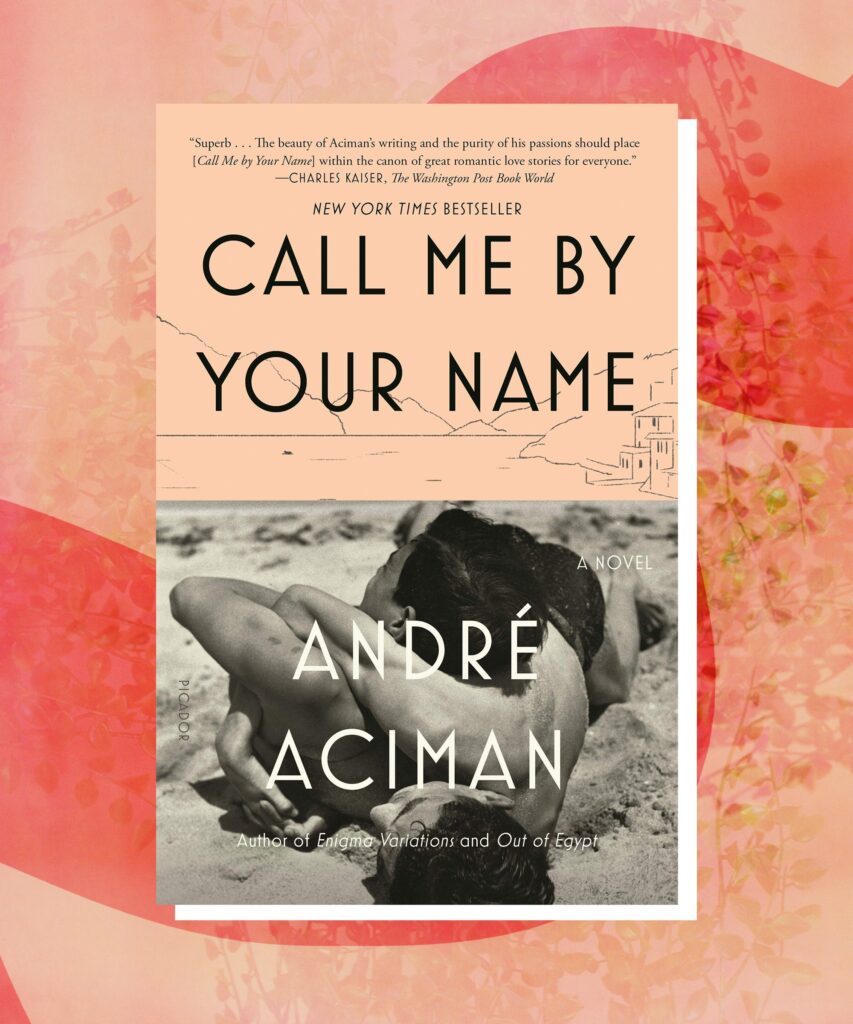Call Me By Your Name by André Aciman is a poetic testament to a summer of love, longing and queerness nestled in the bosom of Italy. This essay seeks to dive into the themes of longing and loss it contains.
In the realms of literature, few narratives possess the unique ability to ensnare the readers within the intricate web of emotions they weave. You’d think it’s about the story – adrenaline-pumping adventures, mind-numbing twists, and whirlwind romances. But more often than not, the key isn’t what intricate plot the author has come up with. The beauty of a book may rely on the author’s skill to keep you hooked – the writing itself. Such is the case with André Aciman’s novel, Call Me By Your Name. The book, first published in 2007, has gracefully etched its name onto the canvas of modern storytelling.
Call Me By Your Name follows the journey of Elio, a precocious 17-year-old lounging away his summer against the picturesque backdrop of the Italian Riviera, and Oliver, a charming scholar from America. As they proceed to live within the same house, interacting and slowly getting to know each other, you are transported into a sun-drenched, aching romance that will leave you wanting more. While the story may seem like a typical run-of-the-mill, off-the-shelf love, Aciman turns it into a tale that speaks of a universal human yearning for connection, the pangs of desire, and the emptiness of loss. We dive into a world where longing is not just a sentiment – but a living, breathing entity, a character in itself, pulsating through every sentence said and unsaid.
In this essay, we shall explore how the author manages to capture both fleeting and binding emotions into an intense romantic episode.
Exploring themes and writing style in Call Me By Your Name

Poetic style of writing
Aciman’s writing can be described as a symphony of words instead of just words strung together to make grammatical or logical sense. There is a certain lilt and poetic sensibility that appears and transcends description. The running theme throughout the book, to simplify it, is yearning full of youthfulness. The author’s choice of words, the rhythm of his sentences, and the evocative imagery he employs craft a lyrical narrative that lingers on your mind way past the book’s pages. They read like verses of a poem, case in point, the following situation.
In a moment of reflection about his memorable summer, Elio once remarks, “Smells and sounds I’d grown up with and known every year of my life until then but that had suddenly turned on me and acquired an inflection forever colored by the events of that summer.”
Also Read: Call Me By Your Name (2017) – An intense exploration of first Love
Centering on themes of longing and loss
The language used in the book serves as a carrier through carefully chosen words to elevate a character’s emotions at any given point, making their sorrows and desires tangible to the observer. It immerses you and helps amplify the intensity of the way Elio longs for Oliver and vice versa.
Longing – and yearning – is the emotional undercurrent that propels the narrative ahead. Treated as a fundamental need that drives the actions and thoughts of the main characters, Aciman skilfully depicts the manifestation of these feelings in each. This leads to an artful showcase of Elio’s internal struggles with his identity and battle with his feelings, Oliver’s plans for the near future, and the unspoken back-and-forth between members of Elio’s family, who also form a major part in the occurrences while maintaining an ostensibly backstage role for most of the book.
Elio’s struggles are a mixture of teenage infatuation and profound emotional connection, while Oliver’s struggles are masked by his eventual vain attempts at keeping a distance. A powerful instance of this struggle is captured in one of their conversations, which goes as follows:
Elio: “If only you knew how little I know about the things that really matter.”
Oliver: “What things that matter?”
Elio: “You know what things.”
And scene. Sigh.
Here, much is said without saying much, as is the case with multiple dialogues that may baffle most people. But it is those who have loved similarly and experienced such loss who understand, nay, feel the meaning behind these words. To put it simply, this is precocious Elio’s way to let Oliver know, “I like you, deeply.” Oliver understands it, but neither of the protagonists wants to admit it out loud; it is an implicit agreement in bold. The characters often speak in seemingly mysterious, eclectic terms, appearing as if they have come to an understanding only with each other and nobody else.
Additionally, the novel is set at the Italian Riviera, a place of stunning beauty and idyllic landscapes. The languid summers, tranquil shores, and cyclic lanes serve as the perfect backdrop for a dreamy romantic escapade and allow you to live inside the setting and watch as the love unfolds.
Without taking up much of the joy of reading the actual book, let’s say that loss permeates the narrative as well, reminding us of the ephemeral nature of joy. It settles itself as the aftermath of longing, the emptiness that may settle when things don’t go as planned. Elio introspects years later about his summer, and this section underlines the lasting impact of his connection with Oliver. The loss of innocence, of an opportunity, of unspoken words. The heart-wrenching moment of separation bundled with the realization of what might have been. The theme of loss transforms from a plot device into a resonant emotional experience for us all.
“In your place, if there is pain, nurse it, and if there is a flame, don’t snuff it out, don’t be brutal with it. Withdrawal can be a terrible thing when it keeps us awake at night, and watching others forget us sooner than we’d want to be forgotten is no better. We rip out so much of ourselves to be cured of things faster than we should that we go bankrupt by the age of thirty and have less to offer each time we start with someone new. But to feel nothing so as not to feel anything – what a waste!”
Also Read: Celebrating Pride Month: 10 LGBTQ+ Fiction Classics You Need to Read
The Movie Adaptation: Translating Longing and Loss to the Screen
The poignant book is brought to life in the 2017 movie adaptation of the same name. Directed by Luca Guadagnino, an artist popular for creating movies characterized by their emotional complexity, the movie has struck a chord with audiences and critics alike. Breathing life into evocative storytelling with breathtaking visuals, the actors’ performances have been lauded as well.
Translating Aciman’s writing into the visual medium presented its challenges. However, the movie successfully manages to capture a good portion of it – a golden shower seems to envelop the photography, lending a certain warmth to the two-hour run. Timothée Chalamet‘s portrayal of Elio and Armie Hammer’s Oliver brings a tangible vulnerability to their relationship, while their chemistry simmers profusely beneath the surfaces. Along with these visual aids, the movie’s soundtrack is a soothing and loving tribute to the story, adding to its overall melancholic beauty.
Conclusion
Call Me By Your Name is a deftly written novel that explores the complexity of human emotion and connection. It captures what it means to long for deeply and creates melodies out of romantic settings. The book shall leave you with a bittersweet appreciation for the happiness as well as the pain that tears through. It invites the readers to unravel fictional hearts and cherish the power of words as they are planted in your souls.

